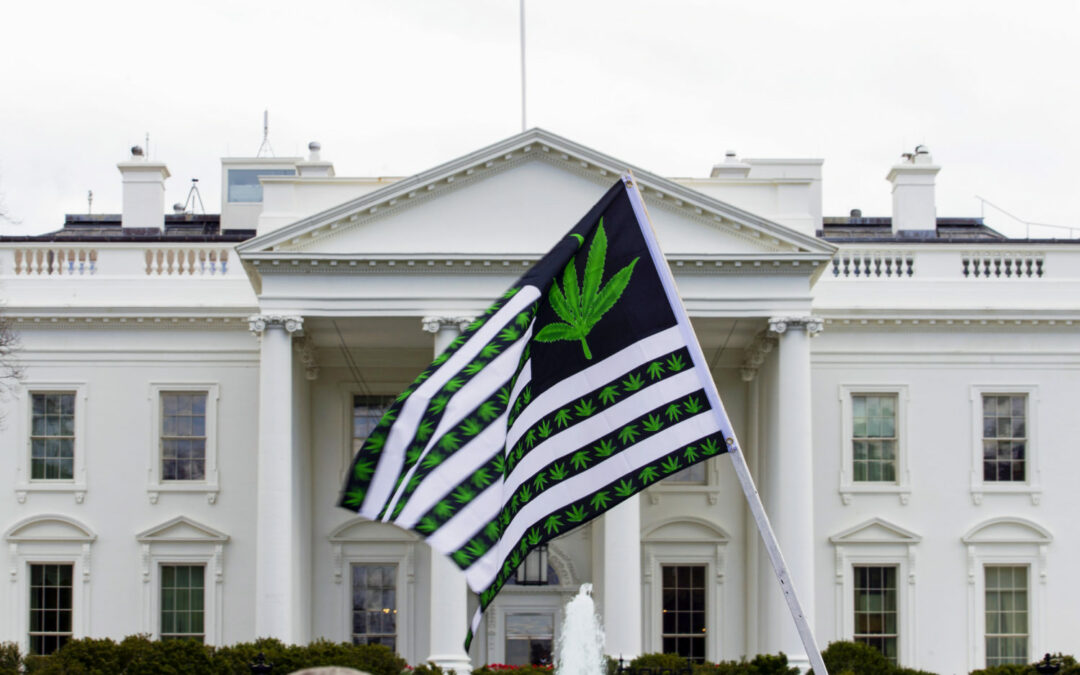Despite the fact that the Marijuana Opportunity Reinvestment and Expungement Act — or MORE Act — was recently passed by the United States House of Representatives, it is unlikely to become law anytime soon.
It’s not the first time the House of Representatives has voted to decriminalize marijuana. The bill was never even reviewed by the Senate the last time it was introduced, in 2020. It’s unlikely to happen this time, either.
President Joe Biden vowed that he would support modifying marijuana’s classification to make it less controlled than other opioids like heroin, but despite state after state legalizing recreational marijuana, he has remained unconvinced. Biden’s marijuana policy is perhaps best exemplified by the fact that five of his colleagues were fired after admitting to previous cannabis use.
“White House Press Secretary Jen Psaki stated hours after the House vote in favor of the MORE Act that the president agreed that “our existing marijuana laws are not working,” but she declined to say if he supports the specific legislation,” according to Marijuana Moment.
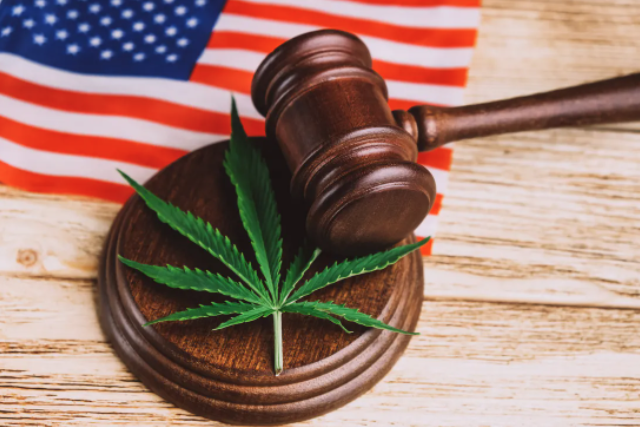
To overcome a filibuster, backers of the MORE Act would require 60 votes in the Senate. The political battlegrounds are described by Mother Jones as follows:
Sure, there were a few defectors on either side. Two Democrats—Reps. Henry Cuellar (Texas) and Chris Pappas (N.H.)—voted against the bill. Three Republicans voted for it: Reps. Matt Gaetz (Fla.), Brian Mast (Fla.) and Tom McClintock (Calif.). And advocates for drug reform now face a Senate that’s at least somewhat sympathetic, with Majority Leader Chuck Schumer planning to introduce his own legislation. But Democrats are unlikely to win many Republican votes with their current proposal, which includes social equity programs to redress the harm done to communities of color by the war on drugs.
In addition to Republicans’ general tough-on-crime opposition to weed, this is another major factor plaguing the prospect of legal pot. A Pew study notes that just 32 percent of Americans aged 75 and older support legalizing recreational and medical weed—far lower than any other age group. That could be a problem in Congress’ upper chamber, which has 11 senators over the age of 75.
… remove marijuana from the list of scheduled substances and establish a process to expunge prior cannabis convictions. It also will impose a federal tax on marijuana products — a 5% excise tax for the first two years, increasing by 1% incrementally each year in the next three years.
More importantly, it would eliminate the existing conflict between federal and state laws, allowing states to set their own regulations without forcing them to do so.
Federal legalization could have far-reaching ramifications for the cannabis industry. It could unlock access to traditional banking and basic financing options, such as raising capital on U.S. exchanges and applying for loans. Currently, cannabis companies and dispensaries are forced to either pay high fees to cannabis-friendly banks or deal solely in cash, as credit card companies and other financial services won’t process their payments, Adam Horowitz, a cannabis attorney at Cole Schotz said.
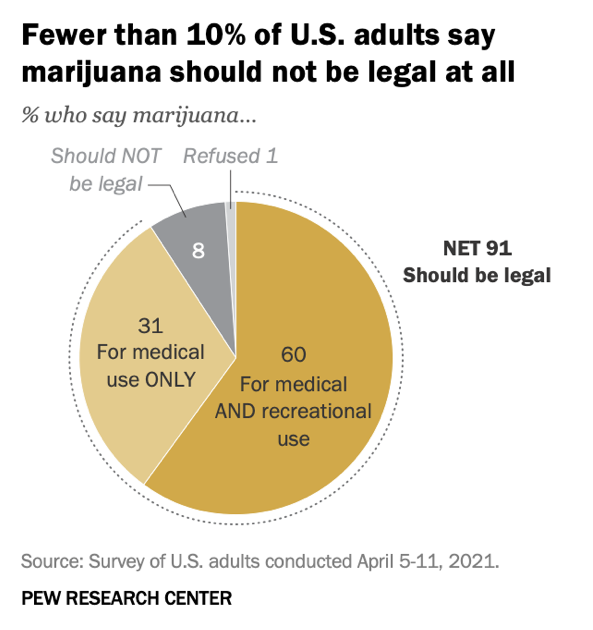
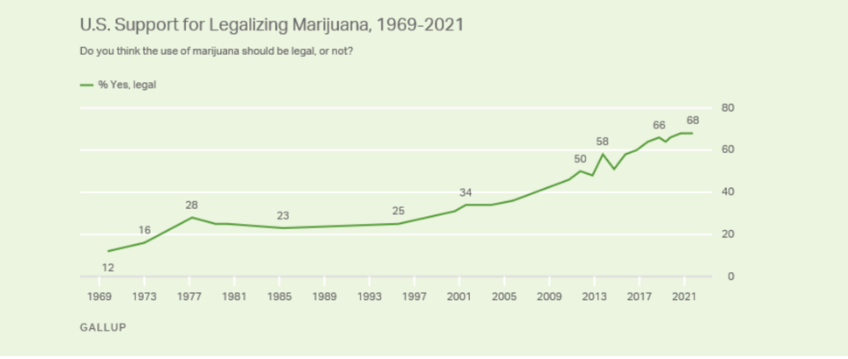
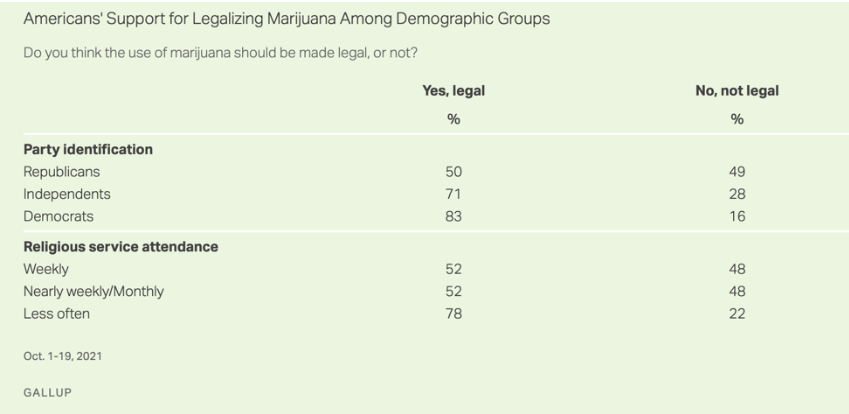
States are stepping in to fill the void left by Congress. According to Vox,
Cannabis is one of the fastest-growing industries in the US; sales of adult-use and medical marijuana products hit $25 billion in 2021 and, by one Wall Street estimate, could reach $100 billion by 2030. Eighteen states have legalized cannabis for adult use, and another 19 currently have at least a comprehensive medical marijuana program. As of 2020, one in three Americans lived in a state with access to legal marijuana, according to Politico, and that number is quickly growing as the East Coast catches up with the West — last year, Connecticut, New Jersey, New York, and Virginia all passed adult-use cannabis laws, joining Maine, Massachusetts, and Vermont. Rhode Island lawmakers are expected to approve a legalization bill this month.
South Carolina lawmakers heard more testimony about medical marijuana this week, and the New Hampshire House passed a marijuana bill. Gov. Michelle Lujan Grisham of New Mexico made cannabis legalization such a priority that she summoned a special session of the legislature to legalize it for recreational use. The sales started a few days ago. While the governor has never taken marijuana, she says she may do so in the future.
Nobody can deny that New Mexico’s new marijuana law means that it is now legal to buy up to 2 ounces of marijuana — enough to roll around 60 joints — just across the border from Texas. According to the Associated Press, Texas intends to continue arresting people who are in possession of marijuana.
The recreational sales will be steps away from neighboring El Paso, where local law enforcement officials are warning, it’s still not legal to bring cannabis across state borders.
“Any person caught with any usable amount of marijuana here will be charged accordingly,” El Paso Police Sgt. Enrique Carrillo told Nexstar affiliate KTSM.
New Mexico is the first state bordering Texas to fully legalize marijuana. Neighboring states Oklahoma and Louisiana have fully legalized medical marijuana usage. Texas remains the largest prohibition state in the country.
Because of that, local El Paso officials said they expect to see more possession arrests in the coming months.
“Do whatever you will with it in New Mexico, but just don’t bring it back into Texas. Because if you are stopped by an El Paso Police officer, you will be charged accordingly,” Carrillo said.
Vox summarizes the sides this way:
Critics of legal marijuana cite the potential for confusion among law enforcement agencies keeping up with evolving regulations, concern about minors gaining access to the drug, a potential drop in property values, and more for maintaining marijuana’s status as an illicit drug. (Though it looks like legal cannabis can actually increase property values.)
Legal cannabis, however, also presents a tremendous financial opportunity, and despite federal inaction, the industry is growing fast; a report from the cannabis website Leafly shows there are more than 428,000 full-time jobs in the cannabis industry, with a 33 percent increase in jobs just last year. Even so, the fallout from the lack of federal legalization is felt by many sectors of society: Medical research is stalled, prisoners are languishing in jails, small businesses are going under without access to federal banking, and big cannabis companies face stiff challenges in raising money to stay afloat as long as marijuana is illegal under federal law.
Certainly, it is an issue journalist should ask about during the midterm races. Vox says:
“Gallup poll numbers indicate that half of Republican voters now also support legal marijuana. Support among younger Republicans is especially high, says Morgan Fox, political director of the National Organization for the Reform of Marijuana Laws (NORML): “It’s difficult to find any issue right now that enjoys as much public support as ending prohibition for cannabis.” It seems increasingly likely that a bipartisan effort to legalize cannabis at a federal level will pass in the next few years.”

